Friday, 2 March, 2018
We got up a little early, before the alarm we’d set for 07:00, prompted by the bright sunshine of a clear morning with blue sky. We had showers and dressed and packed our bags. Then I went down to get some sushi packs for breakfast, while M. had some bread she’d bought yesterday for the purpose. I brought them back and ate while we prepared to check out.
I had the final session of meetings from 09:00, so left M. to finish her packing and check out of the room herself a bit later on, leaving our bags at the hotel concierge desk for retrieval before our flight in the evening. Her plan was to visit the Hikawa Maru museum ship, although this ended up getting derailed…
My meeting ended with an administrative session, summarising the outcomes of all the technical discussions over the past four days, while Katoh-san took minutes. He then had to edit them with the assistance of Kuniba-san and Paul, while the rest of took a break of about half an hour. Dietmar wrote up the resolutions, and I assisted by providing one that I’d noted during the meeting which he hadn’t recorded (about communicating via liaison to JPEG about our intention to begin work on depth mapping standards). Then we had the final short session, which just ran through the minutes, actions items, resolutions, and plans for the next meeting. Paul showed a map of the Apple campus in Cupertino, with nearby hotels and room prices, which were around US$400 a night!
Then we were done and Scott declared the meeting adjourned, and we looked at the time and it was exactly 12:00, when we were scheduled to finish. I believe this is the first meeting I’ve been to that finished right on time, with all the others wrapping up early. I said goodbyes to various people and then left quickly to drop my laptop bag off at the concierge desk in the hotel and walk over to meet M. at the Red Brick Warehouse by 12:30.
When I got there, I found some sort of food fair in progress in the courtyard outside. There were many stalls and long queues of people at most of them. Taking a look, it turned out to be a bakery fair, with all of the stalls selling various breads, pastries, cakes, and so on. The queues in front of some of them were perhaps a hundred or more people long; it was amazing. I walked around briefly but then went inside the warehouse to the designated meeting spot near the Granny Smith Apple Pie & Coffee shop, where I quickly saw M. waiting.
She said she hadn’t made it to the Hikawa Maru, as she’d also been wandering around the bakery fair for a while, and also did some shopping in the warehouse, getting a silver bracelet with the tax free tourist discount. We’d decided to try sushi for lunch, with M. wanting to try some cucumber rolls, so I’d spent some idle time in the morning’s meeting searching for sushi restaurants in the area and marking them on a paper map I’d picked up from the conference centre. There were several clustered around the Kanni-odori and Kannai-sakura-odori area, so we headed there to look for them.
As it turned out, the sushi places were ridiculously hard to find. We passed the Google Maps marked locations for about seven or eight of them without managing to find a single one. It wasn’t until we crossed the main road and train line at Kannai Station and headed down the Isezaki Mall that we finally recognised one, with obvious sushi menu signs outside.
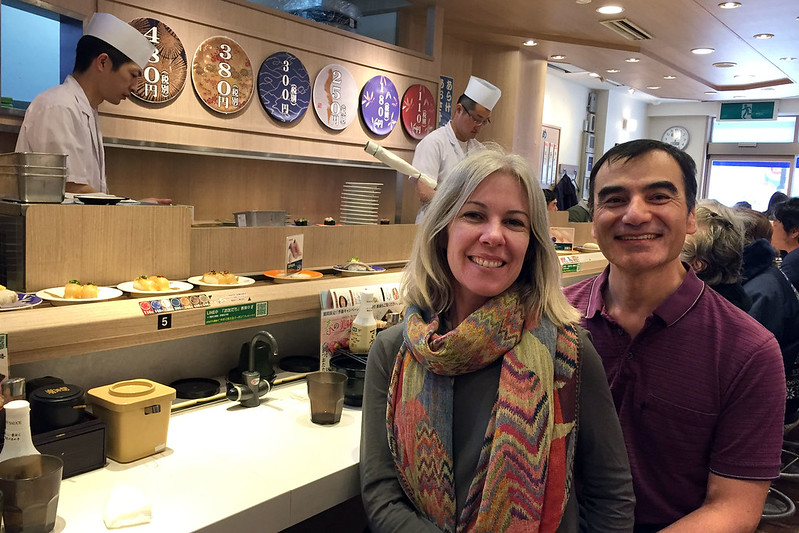 Sushi lunch |
We went in and found it was a conveyer belt style sushi place. A waitress showed us to two seats near the back, and we started picking plates off the belt, with me showing M. what all the bits and bobs were and how the customs of eating sushi in Japan worked. She grabbed a kappa maki roll off the conveyor while I took various fish sushi. We asked the waitress for a bowl of miso soup each to accompany the sushi. We had to order more kappa maki from the chefs, which I managed fine with my limited Japanese: sumimasen, kappa maki-o kudasai! I also ordered a special plate of tuna and salmon sushi. M. was having fun, never having eaten in a sushi place like this before. When we’d had enough, we had the waitress add up the plates and went to the cashier to pay.
Back in the mall, we walked along the shopping street for several blocks, looking at the various shops and food places. We passed a pachinko parlour and I pulled M. in to have a look at the wild array of lights and sounds, but we quickly went out again as it was smoky in there. When the interesting sights started to thin, we turned right to head west across the river to the Noge district, which the map indicated had a vibe similar to the Shōwa Era (whenever that was – checking later says it’s essentially the mid-20th century). As soon as we crossed the river, M. noticed an interesting looking shop that we entered to explore. It had various knick knacks in the windows but turned out to be a second hand book shop, with roughly an equal mix of Japanese and English titles. The knick knacks included bits of pottery, jewellery, and some tiny papier mache cat heads, about the size of a marble.
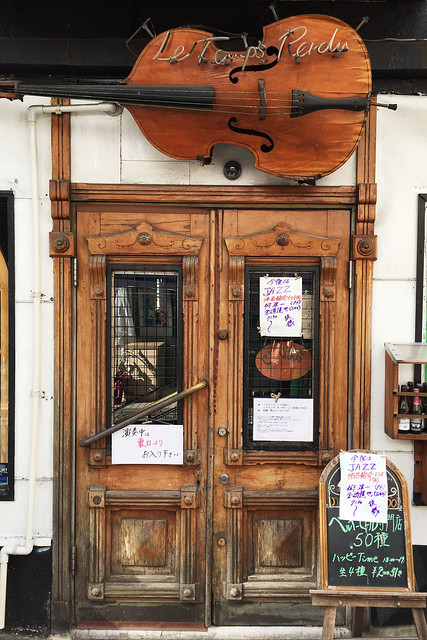 Jazz club in Noge |
Walking north, we zig-zagged our way through Noge, admiring the old style houses and many restaurants. There also appeared to be some less than savoury “gentleman’s clubs”, as well as a few decent looking jazz clubs. After exploring most of the blocks in the neighbourhood, we found a place called Chigusa, which advertised modern jazz and coffee. M. felt like a coffee, so we decided to poke our noses in to see what it was like. When I did so, a man inside ushered us in to seats at a table near the front – the room had a definite front, where a total of six tables for two faced, like rows of school desks. At the front was not a stage for live music, but two enormous dark-stained wooden speaker boxes, almost the height of a person, belting out jazz tunes. On the right was an old guy, he must have been about 80, manning two turntables, and behind him were shelves stuffed full of LP records. There must have been thousands of records there.
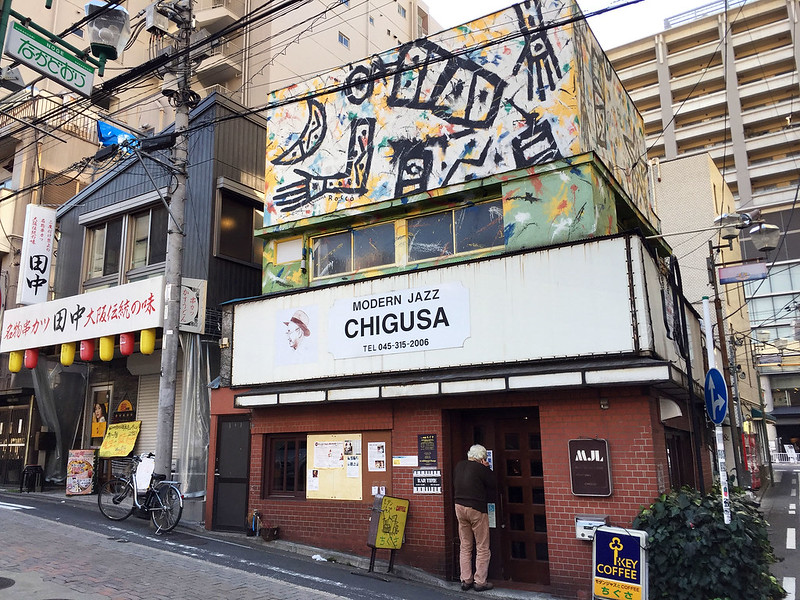 Chigusa jazz club |
The menu on our table basically just had coffee and beer. It also said that before 18:00 was non-smoking time, but after 18:00 the place allowed smoking and served small snacks like bowls of nuts. And that customers were welcome to browse the catalogue of albums and select one to play. M. ordered a coffee and I ordered a beer. A young guy made the coffee using a siphon apparatus like we’d first seen in San Francisco a few weeks ago. It came black and M. had to ask for milk, but said it was good coffee. We sat for a while and the first jazz album ended, and the old man cued up another record, with vocals from Frank Sinatra. We knew because he displayed the record cover in a stand on the desk where his turntables were. After a few tracks he changed to more instrumental jazz. A Japanese guy at the table next to ours looked like a real hep cat, with dark round glasses, and was tapping along to the music. The tables behind us were also full of older men having drinks and just listening to the jazz. The DJ brought over two large volumes of the catalogue, A to L and M to Z plus vocalists and Japanese jazz artists, and invited us to select something. But we were close to leaving and declined to choose after flipping through briefly to see the mind boggling collection of artists in there.
We left this odd little jazz cafe and covered the remaining street of Noge. We were about to head back towards our hotel, perhaps to see if we could visit the tall ship berthed nearby, when I noticed we were near a place marked on the map as a shrine, the Iseyama Kotai-Jingu. I said we might have time to go see that, and M. agreed, so we headed further west. After crossing a main road and heading another block or two over, we suddenly encountered a steep hill. We ascended on a series of steps and emerged in a back street at the top. Another short block later we arrived at the entrance to Iseyama Kotai, which was a series of granite steps leading further up the hill to the summit, where the main part of the shrine lay.
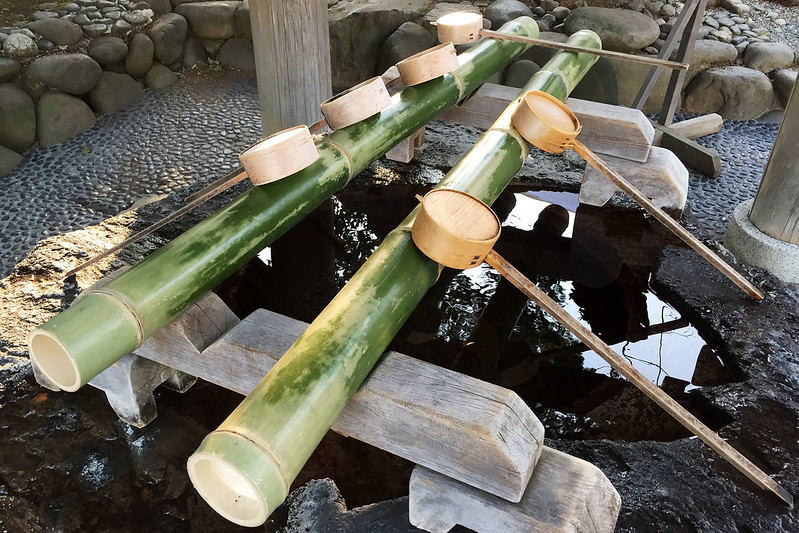 Water and ladles for ritual cleansing, Iseyama Kotai-jingu |
As we entered, I saw the water fountain with bamboo ladles where you are supposed to wash your hands for ritual purification before entering the shrine. I let M. pour a ladle of water over my hands, but it was too cold for her to want to do the same. Then we entered and walked around the traditional looking Shinto shrine. In the main courtyard however, there were some young men in white costumes raising some sort of large inflatable structure. It looked at first like a giant stunt fall airbag, but we later saw it rising up to form a tent-like structure. We had to walk around this activity to see all of the various parts of the shrine around the perimeter. There were large wooden lanterns scattered around, and several wooden structures, with courtyards of white pebbles to walk across and granite stepping stones and wooden torii gates and a place to hand wooden blocks written with messages. M. pointed out a sakura tree with white blossoms on it, another harbinger of an early spring here.
 Small shrine inside Iseyama Kotai-jingu |
After spending an enjoyable half hour or so wandering around the shrine, we walked back down the steps and down a sloping street towards the Landmark Tower and then on through it to Mark IS for an afternoon snack. M. got one of the waffle fish, with strawberry filling, while I got a traditional pink, white, and green hanami dango skewer, with mochi balls of the three colours. I liked this better than the salted caramel sauce one from yesterday.
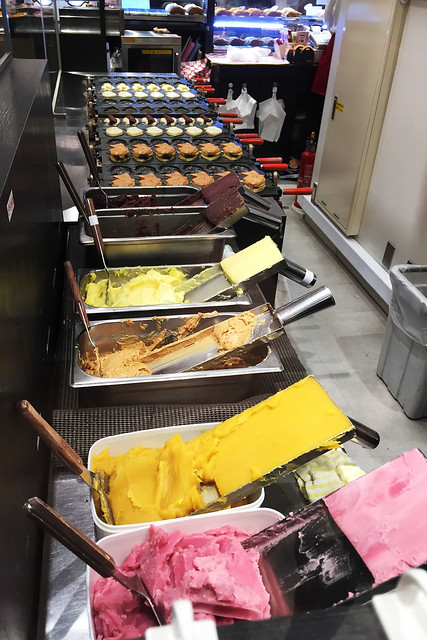 Waffle fish cooking at Mark IS |
After eating these, we returned to the hotel to pick up our luggage and wait for the airport limousine bus to take us to Haneda Airport. We both swapped some clothes over into our bags for the flight, not needing to dress too warmly now. The limousine bus arrived just a minute or two after the scheduled time, then wound through Yokohama picking up a few passangers at other stops, but there were only a dozen or so passengers in total. We drove north to Haneda and got off at the international terminal to check in.
There was a very long line at the Qantas check-in economy class counters, but we bypassed this thanks to my silver frequent flyer status and used the business class check-in, getting through very quickly. Security and immigration checks were very fast, as there were no queues at all. We had to stop at the customs counter so the guy there could check M’s passport and tear out the tax-free form that had been stapled in when she’d bought a silver bracelet earlier. Then we were through to the gate lounges.
We decided to have something to eat, and found a soup place which had some vegetarian options. M. chose a tomato and capsicum soup, while I got a chicken tortilla soup, which was basically chicken and corn with Mexican flavouring, nice and spicy. We also got mini baguettes with them, which were hot and fresh, as if just out of the oven. Then we relaxed a bit until close to boarding time. We moved to the gate and people were still sitting around, so we simply stood close to the front of the queuing area for economy class, and a ground crew member looked at our passports and scribbled on our boarding passes and told us to form two lines. So we were the very first people in the queue! They didn’t board by rows, and only a dozen or business class people went in before us, so we were on very early and grabbed enough storage space nearby for out bags, which was lucky because as the plane filled up people around us had real problems, and some had to get crew to assist in finding space for their bags.
 Soup at Haneda Airport |
The flight was eventless, and we mostly tried to doze during it, waking up as they served breakfast. We were scheduled to land at 09:35 on Saturday morning, but arrived early, touching down at 09:02. We passed out through immigration and customs quickly, picking up a bottle of Jagermeister I’d bought duty free when we departed, and headed to the taxi rank, where there was no queue. We made it home on a bright and sunny Saturday morning just before 10:00, less an an hour after the plane touched down! Another fun trip completed!

I presume you know this already but you haven’t mentioned it that I saw, so just in case … Granny Smith’s actual farm was not very far from where you work (in fact just a couple of hundred metres to the south and south-west of Curzon Hall (the location of which I assume you’re familiar with).
Mmm, yes, I was aware of that. And the Eastwood Granny Smith Festival every year.